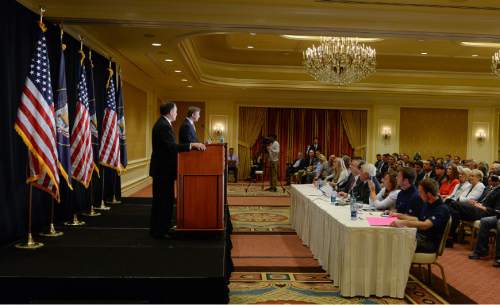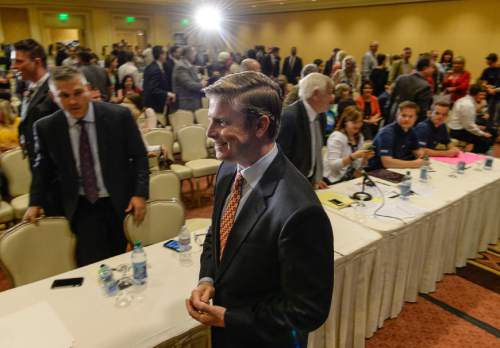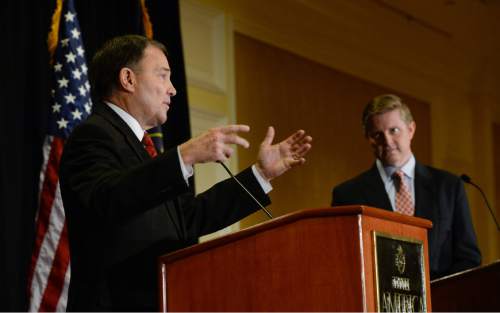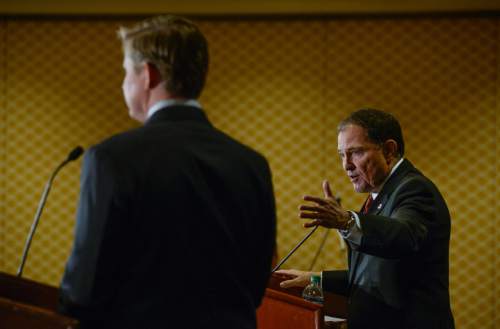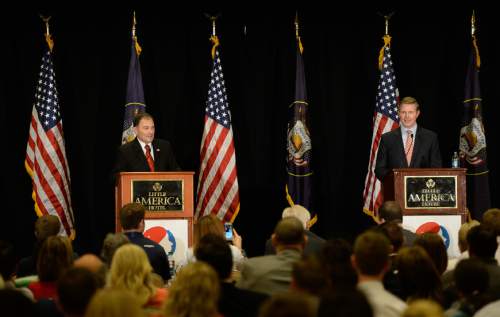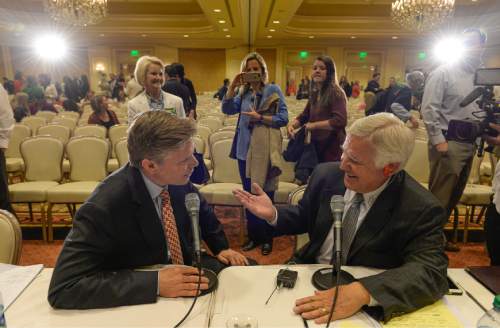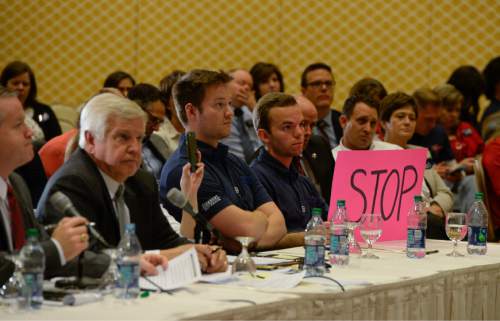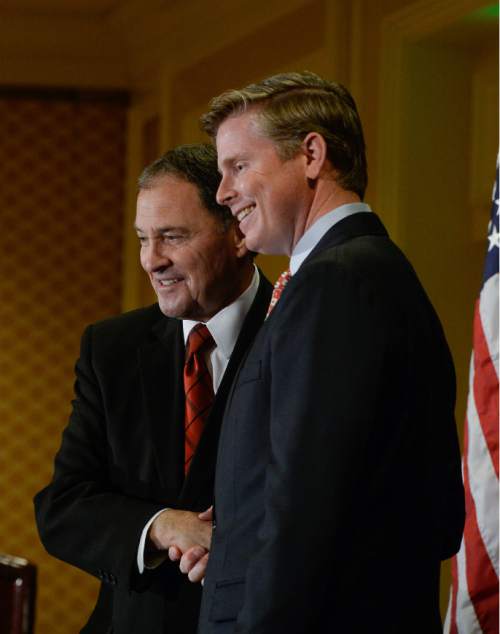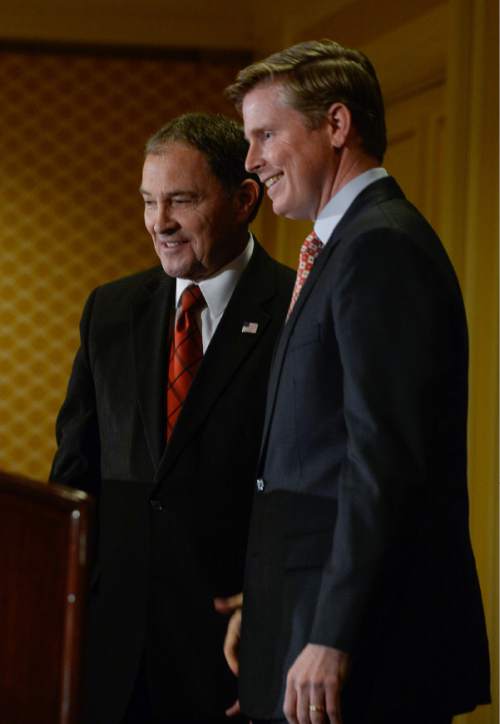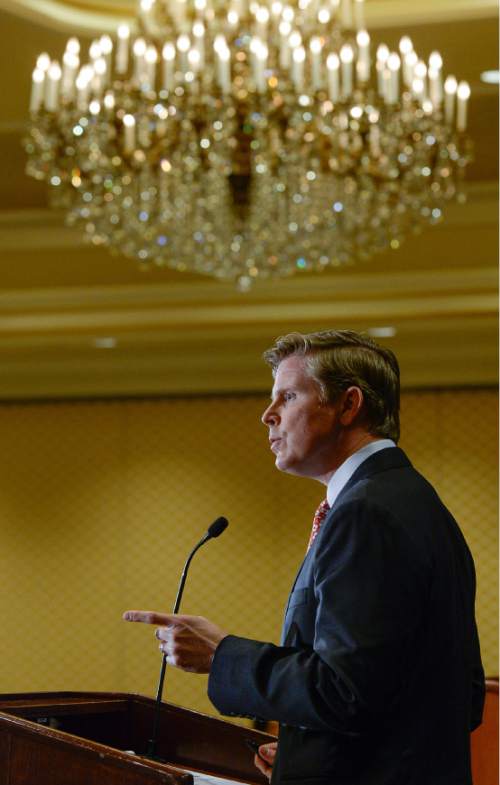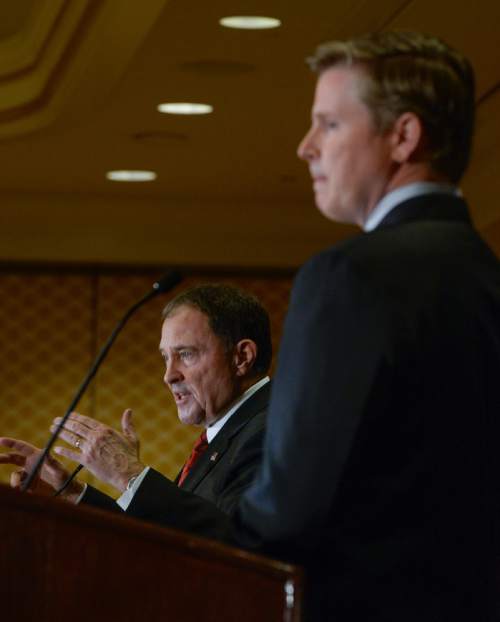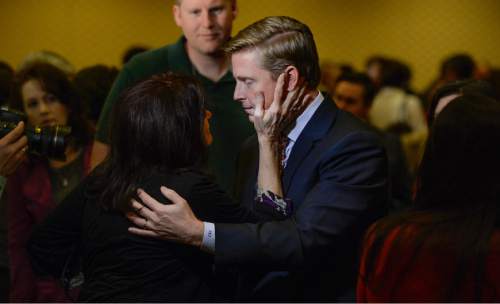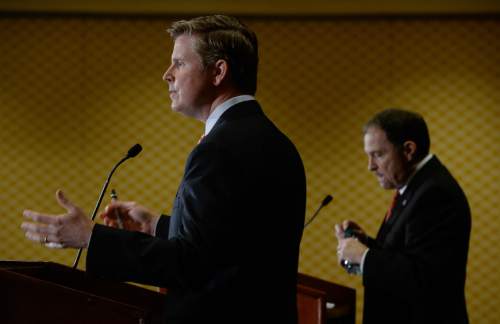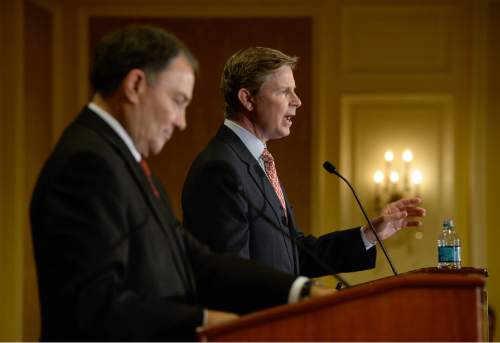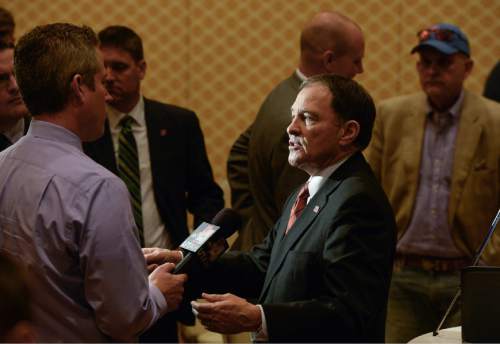This is an archived article that was published on sltrib.com in 2016, and information in the article may be outdated. It is provided only for personal research purposes and may not be reprinted.
Republican challenger for governor Jonathan Johnson swiped at Utah Gov. Gary Herbert for not immediately suing the federal government to demand ownership of more than 30 million acres of federal land — a move that Herbert said would be "reckless" and guarantee a new national monument in the state.
Herbert argued that Utah's congressional delegation needs time to work on Rep. Rob Bishop's Public Lands Initiative and suing the federal government would derail their work.
"The counsel we received is, 'Do not sue unless there's a Republican in the White House.' This is not a slam dunk. This is a hard challenge," the governor said during the first head-to-head debate between the two GOP candidates. "As soon as we file that lawsuit, all the good work they've done [on the Public Lands Initiative] will be thrown out. … We will have a national monument by next Friday if we file that litigation today."
Herbert said after the debate, sponsored by the Utah Federation of Republican Women, that he hasn't been assured the administration would hold off on a monument while the Public Lands Initiative proceeds, but he has been told through "side channels" to "keep the powder dry."
"If that doesn't work politically," Herbert said, "then you can pull the big trigger."
Johnson countered that Herbert hasn't done enough to assert state ownership of the lands and suing the federal government actually would help the congressional delegation's efforts and rural Utah.
"The Legislature has given the governor's office tool after tool," Johnson said. "It's time the state bring the lawsuit to transfer the land back. … I'm ready to bring that suit quickly when I'm governor."
It was one of numerous areas — from gun laws to taxes to education standards and health reform — in which Johnson said Herbert has not been conservative enough and has failed to show leadership during his time in office.
"While Gary Herbert and I are both Republicans, we differ on how we would address issues. You have a choice," Johnson said. "Gary Herbert points to his record, which is good in some respects, and says, 'Why risk it?' To which I would respond, 'Don't settle. Utah can do better.' "
After the debate, Herbert said he is a Reagan Republican with conservative bona fides and believes the GOP delegates will support him.
"I'm sure that'll be the first time in my life, certainly as governor, that anybody said I'm not right wing enough," Herbert said. "I'm probably the most conservative governor we've had in my lifetime, but I'm not a flamethrower. I try to bring people together."
Johnson criticized Herbert for signing into law a pair of tax increases passed by the Legislature — a gas tax hike and a property tax increase to help rural and low-income schools — in the past two years, at a time the state was posting hundreds of millions of dollars in surpluses and, Johnson contends, should have been cutting taxes.
Johnson challenged Herbert to pledge not to raise taxes again, but Herbert refused. "It would be foolish to say something that blanket," Herbert said.
"The easier thing for a politician to do is, once he's elected, to raise taxes again and again and again," Johnson said.
On gun issues, Johnson also challenged the governor to support a bill labeled "constitutional carry" that would let adult Utahns carry concealed firearms in most places in the state without having to go through a background check and take a class to get a concealed-weapons permit.
Herbert has vetoed the bill in the past and threatened to do so again this year before the sponsor shelved the measure.
"There's no reason we need a piece of paper to exercise our First Amendment rights," Johnson said. "There should be no reason we need a piece of paper to exercise our Second Amendment rights."
Herbert said he has met with National Rifle Association Executive Vice President and CEO Wayne LaPierre about Utah's gun laws, and that the pro-gun group approves of them. He said, when it comes to Utah's gun laws, "If it ain't broke, don't fix it."
About 4,000 GOP delegates will decide the fate of the Johnson campaign at the Republican state convention in two weeks. Johnson needs to win support from at least 40 percent of the delegates to advance to a primary in late June.
Because he opted not to gather signatures to get a spot on the primary ballot, Johnson will be eliminated if he doesn't get at least 40 percent support. Herbert has gathered enough signatures to be assured a spot in the primary already.
Johnson said he had planned to gather signatures but opted not to, going strictly with the convention route, because he is a supporter of the convention system and because signature gathering discounts the importance of rural Utah.
"If the governor supports the caucus-convention system, I just challenge him to withdraw his signatures and go through the caucus-convention system," Johnson said to applause from some in the audience.
Herbert reiterated that he wishes he would have vetoed the bill that created the signature path to the ballot, because it has pitted Republicans against one another. But he said it made sense to use both the signature and convention tracks and added that Johnson changed his mind to pander to convention delegates.
"The hypocrisy of my opponent is startling," Herbert said. "Changing your mind for some political whim is not statesmanlike."
A poll released Monday by UtahPolicy.com showed Herbert leading Johnson 58 percent to 20 percent in the sample of 600 Utahns. Johnson dismissed the survey, saying the firm that did the sample, Dan Jones & Associates, is biased because it is also Herbert's longtime pollster.
"He's bought and paid for by the governor," Johnson said.
The state, Johnson added, should join others that have legalized medical marijuana to treat various diseases. Herbert said the federal government needs to change marijuana's status as a controlled substance to free up research on the drug.
Johnson criticized efforts to expand Medicaid coverage to help low-income Utahns get health insurance, arguing Utah has enough charity care in place. He said Herbert's Healthy Utah proposal was "irrational" and would put taxpayers on the hook. Herbert said it was an attempt to "play the cards you're dealt" and get a program in place that the state could control.
After the debate, Johnson also reiterated his desire to privatize Utah liquor stores. The state could still regulate the products that are sold and the distribution, but it does not need to be running the retail stores, he said. He made a similar proposal months ago when he joined the gubernatorial race.
A third Republican candidate for governor, Carlos Tavares Jr., declined to attend. Candidate Nate Jensen also was not at the debate.
The eventual GOP nominee will face either Michael Weinholtz or Vaughn Cook, who are seeking the Democratic nomination, along with several minor-party candidates.
Twitter: @RobertGehrke


